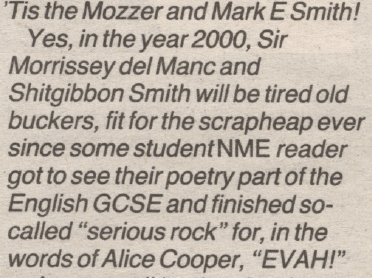In an article last Thursday, I looked at the rise of the colorful Trumpian epithet shitgibbon. The word first hit it big last June when Donald Trump was called a “tiny fingered, Cheeto-faced, ferret wearing shitgibbon” on Twitter and then made an even bigger splash last week when Pennsylvania state Sen. Daylin Leach called the president a “fascist, loofa-faced, shit-gibbon.” But where did this exquisite creation come from, originally?
Some have assumed it must be Scottish, since the June insult came at the height of backlash against Trump’s visit to Scotland, where he was lambasted for his tonedeaf comments about the Brexit vote. But that tweet actually came from an Englishman, one who goes by MetalOllie on Twitter (and will only reveal that his first name is Darren due to online death threats).
My fellow word sleuth Hugo van Kemenade found examples as early as 2000 in Usenet forum posts about bootlegging in the British music scene, where shitgibbon was deployed against ungrateful traders of copied music. More than a decade later, it got a boost from an early episode of HBO’s Veep in 2012, wherein the character Sen. Andrew Doyle calls a rival a “gold-plated fucking shitgibbon.”
And there the hunt might have remained, if not for a comment on my original post on the Strong Language blog. The British writer David Quantick dropped this bomb:
Hi, I wrote the Veep line. It was originally “spunk-faced shitgibbon,” a phrase I used in a 1988 column in New Musical Express and have put in most of my writing since. PS I’m not Scottish and have nothing to do with bootlegging.
Quantick’s claim immediately rang true. He and his fellow journalist/comedian Steven Wells got their start writing for NME, and for a few years they collaborated on a satirical, somewhat stream-of-consciousness column for the magazine. That caught the attention of Armando Iannucci, who snapped them up to write for Chris Morris’ radio news parody On the Hour in the early ’90s. In a 2009 oral history for the Quietus (published soon after Wells died of lymphoma), Quantick recalls how Iannucci hired them: “Armando saw some comic articles by Steven Wells and me in the NME and, perhaps assuming we were 17-year-old glueheads, asked us to write for him. I think he was a bit upset when we turned out to be very old.” Quantick contributed to the radio show’s TV spinoff, The Day Today, as well as to Iannucci’s later political satires: The Thick of It, and, of course, Veep.
But I needed to confirm Quantick’s claim with some hard evidence. Unfortunately, his old columns with Wells do not appear to be currently available in any public digitized archive (though databases like Rock’s Back Pages and Proquest offer some coverage of NME). And Quantick’s memory is a bit hazy. “I only remember the line because Steven, who was a hard-to-please co-writer, liked it,” he told me via email. He recalls that once he hit upon “spunk-faced shitgibbon” in 1988 or so, he continued to recycle shitgibbon in writing for other outlets. (He believes he may have uncharitably called Charlie Chaplin a “bowler-hatted shitgibbon” in a column for Select sometime in the ’90s.)
As luck would have it, the Norwegian programmer Lars Magne Ingebrigtsen scanned some of the old Quantick/Wells columns, among other NME articles from 1989–90. His website includes 16 scans of the columns, which went by many names, sometimes changing week to week: “Culture Vulture,” “Smiley Vulture,” “Ride the Lizard,” “Ride the Puffin,” “New Puffin on the Block,” and “A Clockwork Puffin.” (“The puffin obsession was to do with Björk’s old band the Sugarcubes admitting to Steven that they had eaten puffin,” Quantick told me.)
Plowing through the scans, I finally found a smoking gun in a column from the Jan. 13, 1990, issue of NME. In it, Quantick and Wells imagine Morrissey of the Smiths (nickname: the Mozzer) and Mark E. Smith of the Fall in the year 2000. (Morrissey and Smith were frequent targets of the writers’ sardonic barbs.)
’Tis the Mozzer and Mark E Smith! Yes, in the year 2000, Sir Morrissey del Manc and Shitgibbon Smith will be tired old buckers, fit for the scrapheap ever since some student NME reader got to see their poetry part of the English GCSE and finished so-called “serious rock” for, in the words of Alice Cooper, “EVAH!”

Screengrab from 1990 issue of NME
So that seals shitgibbon for Quantick and Wells. (Even if Quantick was the originator, Wells clearly enjoyed using it too for years to come: In a 2006 column for Philadelphia Weekly, Wells had this to say about controversial gun ornaments from Urban Outfitters: “Aren’t there like real guns you mewling shitgibbons could get all excited about, ya?”) Some enterprising researcher may be able to dig up even earlier examples of shitgibbon from ’88 or ’89, but it may require a trip to a place like the British Library that has a complete NME archive.
I asked Quantick what he thought of his coinage’s new life in the age of Trump. “I’m surprised and delighted that a word I made up in the 1980s to insult British indie rock stars has resurfaced in the context of 21st-century U.S. politics and the shitgibbon in the White House,” he said. “It’s bizarre and a very odd journey for a very silly word. I wonder what other phrases and words will emerge next?”
That’s a question that is already engaging some linguists. Taylor Jones, a graduate student in linguistics from the University of Pennsylvania, wrote a post on his Language Jones blog that considers how shitgibbon fits an emerging pattern for obscene insults like douchewaffle, turdweasel, and jizztrumpet, all of which consist of a monosyllablic expletive plus a trochee (a stressed syllable followed by an unstressed syllable). Along with metrical concerns, Jones notes how vowels often repeat in such words, as in dickbiscuit, craprabbit, and spunkpuffin. Meanwhile, Jamie Reilly, director of the Memory, Concepts, Cognition Laboratory at Temple University, has been working with colleagues on a research project analyzing people’s judgments of such novel profanities. Clearly, shitgibbon and its kin will provide scholarly fodder for years to come.
